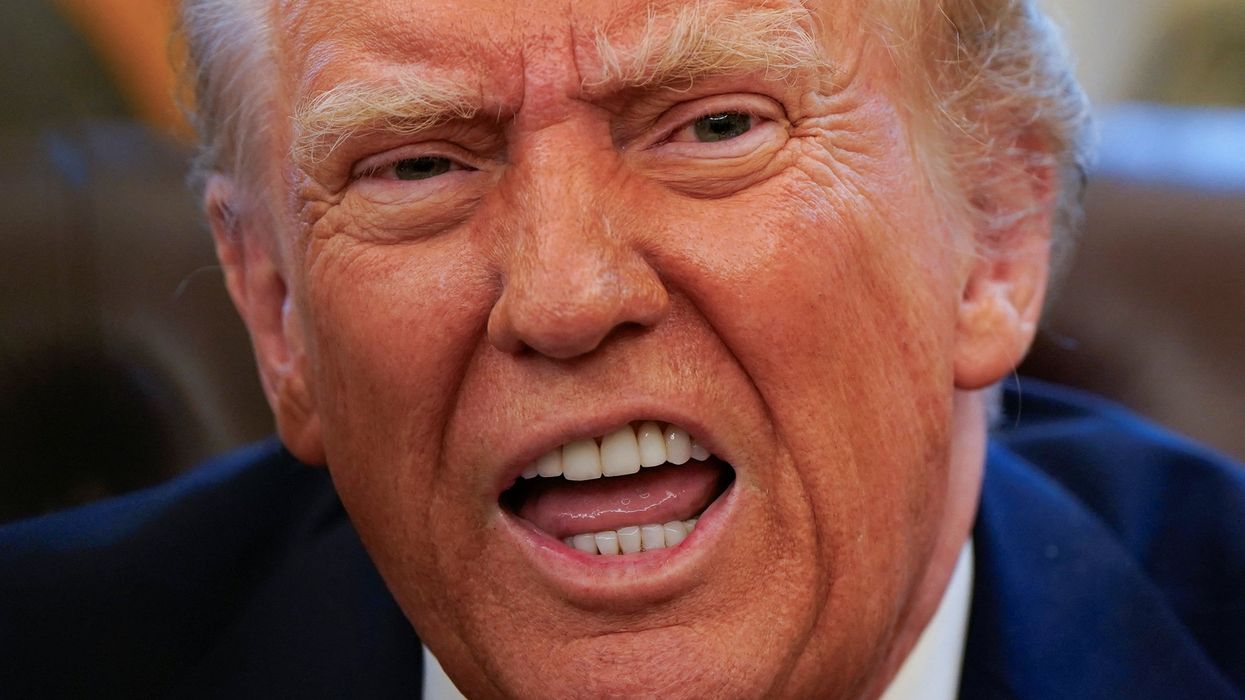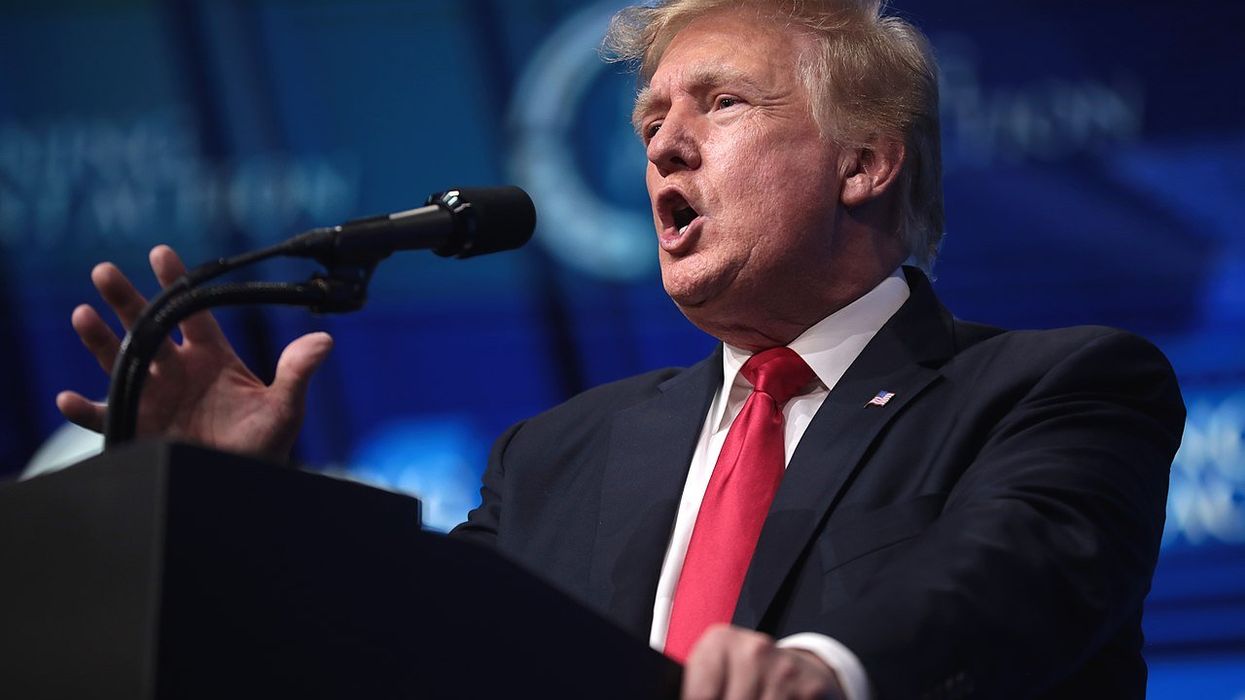David McAfee
February 16, 2025
RAW STORY

A farm worker in a field. (Shutterstock)
Donald Trump's latest actions are hurting one of his biggest bases of support, the National Farmers Union president said Sunday.
Rob Larew, who leads the second-largest general farm organization in the country, noted over the weekend that the President of the U.S. is wrong to freeze funding that farmers need.
"The Trump administration’s decision to pause and review federal funding has sparked uncertainty for many Americans. Even if you have not personally felt the effects yet, you soon might, because these abrupt freezes are hitting family farmers and ranchers hard. And when farmers struggle, every consumer feels it at the grocery store," the farming policy advocate wrote.
According to Larew, Trump's freeze "has most immediately impacted federal conservation and voluntary climate-smart agriculture projects."
"Across the country, farmers have been left in limbo after making sustainability investments, trusting that the government would uphold its commitments," he wrote, adding, "For example, some farmers who purchased cover crop seed to improve soil health or installed solar panels to reduce energy costs are now learning that federal reimbursements have been cut off. These are not theoretical losses. These are real financial burdens that could push family farms into bankruptcy. Without intervention, these cuts will ripple through rural economies. Every farm that goes out of business means fewer families in rural communities, less money spent at the local businesses, fewer kids in the local schools, and fewer tax dollars for roads, hospitals and emergency services."
Further, according to Larew, "Beyond agriculture, the funding freeze threatens the infrastructure that keeps rural communities running."
"Federal grants and loans help small towns replace aging and costly infrastructure, such as broadband and water systems, and invest in local meat and food processing," he added. "Local entities have relied on federal loans and loan guarantees — existing commitments that the government is now freezing, leaving farmers, investors, lenders and rural communities on the hook for funds already spent."
He also encouraged lawmakers to "listen to the voices of those most impacted and recognize the real-world consequences of any cuts."
"Our rural economy and food system — and therefore all of America — depends on it," he said.
Read the full piece here.
'This isn’t just hippie-dippy stuff': Farmers 'reeling' from Trump spending freezes

Photo by Gregory Hayes on Unsplash
Roxanne Cooper

Photo by Gregory Hayes on Unsplash
Roxanne Cooper
February 15, 2025
ALTERNET
According to a new report from the New York Times, a "core constituency" is "reeling" from "a rapid-fire array of directives by the Trump administration."
“This isn’t just hippie-dippy stuff,” said Aaron Pape, a Wisconsin farmer. “This is affecting mainstream farmers."
The Trump administration's recent directives have left farmers and rural communities across the United States grappling with financial uncertainty. A series of executive orders have frozen billions of dollars in federal funding for agricultural programs.
The impact is widespread and has created a ripple effect across rural America, according to the Times.
For example, Skylar Holden, a cattle rancher in Missouri, signed a $240,000 cost-sharing contract for property improvements but is now at risk of losing his farm. He laments, "Whenever my farm payment comes due, there's a good chance that I'm not going to be able to pay it."
In another example, Minnesota seed processor Tom Smude learned that his $530,000 grant for equipment was paused, leaving him unable to pay for ordered machinery. He expressed confusion about the president's priorities: "It's what he wants, growth in industry and keep America going. I feel like I'm doing my part and now you're going against what you said, a little bit."
The uncertainty has affected farmers' ability to plan for the year. Nick Levendofsky, executive director of the Kansas Farmers Union, stated, "Farmers don't need any more uncertainty than they already have."
While some farmers remain supportive of President Trump, many others expressed concern about the long-term consequences of these policy decisions.
Read the full report at the New York Times (subscription required).
According to a new report from the New York Times, a "core constituency" is "reeling" from "a rapid-fire array of directives by the Trump administration."
“This isn’t just hippie-dippy stuff,” said Aaron Pape, a Wisconsin farmer. “This is affecting mainstream farmers."
The Trump administration's recent directives have left farmers and rural communities across the United States grappling with financial uncertainty. A series of executive orders have frozen billions of dollars in federal funding for agricultural programs.
The impact is widespread and has created a ripple effect across rural America, according to the Times.
For example, Skylar Holden, a cattle rancher in Missouri, signed a $240,000 cost-sharing contract for property improvements but is now at risk of losing his farm. He laments, "Whenever my farm payment comes due, there's a good chance that I'm not going to be able to pay it."
In another example, Minnesota seed processor Tom Smude learned that his $530,000 grant for equipment was paused, leaving him unable to pay for ordered machinery. He expressed confusion about the president's priorities: "It's what he wants, growth in industry and keep America going. I feel like I'm doing my part and now you're going against what you said, a little bit."
The uncertainty has affected farmers' ability to plan for the year. Nick Levendofsky, executive director of the Kansas Farmers Union, stated, "Farmers don't need any more uncertainty than they already have."
While some farmers remain supportive of President Trump, many others expressed concern about the long-term consequences of these policy decisions.
Read the full report at the New York Times (subscription required).
Worry about 'job security' puts deep red state on edge as Trump slashes federal workforce

REUTERS/Elizabeth Frantz
U.S. President Donald Trump speaks while signing executive orders during a brief event in the Oval Office at the White House in Washington, U.S., January 30, 2025.
"More than half of the roughly 40,000 federal civilian employees in Alabama live in the congressional district that includes Huntsville, according to the Congressional Research Service as of March 2024," the Times reporters explain. "There are also thousands of workers there whose jobs are tied to government contracts and could be affected…. More than 6200 people work at the flight center alone, with about 2300 of them classified as federal civil employees of NASA."
Medina and Cochrane add, "There are lingering memories of past layoffs: more than 1000 jobs in Huntsville were lost when Constellation, a program to return astronauts to the moon, was shut down in 2010."
The journalists note that conservative Sen. Katie Britt (R-Alabama) "is among a number of Republicans who have raised concerns about the effect of a plan that would cut $4 billion in federal funding for research at the nation's universities, cancer centers and hospitals."
"Those cuts, which a federal judge put on hold this week, could affect research programs at the University of Alabama in Huntsville and elsewhere in the state," Medina and Cochrane report. "Such cuts could trickle to other facets of the Huntsville economy. Terrence Harris, a real estate agent in Huntsville, said that in the last couple of weeks, several of his clients who work for the government have backtracked from plans to purchase a home because they feel concerned about their job security."
Read the full New York Times article at this link (subscription required).

REUTERS/Elizabeth Frantz
U.S. President Donald Trump speaks while signing executive orders during a brief event in the Oval Office at the White House in Washington, U.S., January 30, 2025.
February 15, 2025
ALTERNET
Former Republican National Committee (RNC) Chairman Michael Steele often warns, during his appearances on MSNBC, that the Trump Administration's dramatic cuts to the United States' federal workforce will have a major impact on the conservative red states that voted heavily for Donald Trump in 2024 — and not in a good way. Programs like Social Security, Medicare and Medicaid, Steele emphasizes, are not used exclusively in Democratic blue states.
One red state that is likely to feel the impact of the Trump/DOGE job cuts, according to New York Times reporters Eduardo Medina and Emily Cochrane, is Alabama — especially the city of Huntsville.
Although the national popular vote was close in the 2024 presidential election — Trump defeated Democratic nominee Kamala Harris by roughly 1.5 percent nationally — Alabama wasn't close at all: Trump carried Alabama by about 30.5 percent.
But Medina and Cochrane, in an article published on February 15, stress that Huntsville (which they describe as an "aerospace behemoth") is likely to be hit hard by Trump Administration cuts.
Former Republican National Committee (RNC) Chairman Michael Steele often warns, during his appearances on MSNBC, that the Trump Administration's dramatic cuts to the United States' federal workforce will have a major impact on the conservative red states that voted heavily for Donald Trump in 2024 — and not in a good way. Programs like Social Security, Medicare and Medicaid, Steele emphasizes, are not used exclusively in Democratic blue states.
One red state that is likely to feel the impact of the Trump/DOGE job cuts, according to New York Times reporters Eduardo Medina and Emily Cochrane, is Alabama — especially the city of Huntsville.
Although the national popular vote was close in the 2024 presidential election — Trump defeated Democratic nominee Kamala Harris by roughly 1.5 percent nationally — Alabama wasn't close at all: Trump carried Alabama by about 30.5 percent.
But Medina and Cochrane, in an article published on February 15, stress that Huntsville (which they describe as an "aerospace behemoth") is likely to be hit hard by Trump Administration cuts.
"More than half of the roughly 40,000 federal civilian employees in Alabama live in the congressional district that includes Huntsville, according to the Congressional Research Service as of March 2024," the Times reporters explain. "There are also thousands of workers there whose jobs are tied to government contracts and could be affected…. More than 6200 people work at the flight center alone, with about 2300 of them classified as federal civil employees of NASA."
Medina and Cochrane add, "There are lingering memories of past layoffs: more than 1000 jobs in Huntsville were lost when Constellation, a program to return astronauts to the moon, was shut down in 2010."
The journalists note that conservative Sen. Katie Britt (R-Alabama) "is among a number of Republicans who have raised concerns about the effect of a plan that would cut $4 billion in federal funding for research at the nation's universities, cancer centers and hospitals."
"Those cuts, which a federal judge put on hold this week, could affect research programs at the University of Alabama in Huntsville and elsewhere in the state," Medina and Cochrane report. "Such cuts could trickle to other facets of the Huntsville economy. Terrence Harris, a real estate agent in Huntsville, said that in the last couple of weeks, several of his clients who work for the government have backtracked from plans to purchase a home because they feel concerned about their job security."
Read the full New York Times article at this link (subscription required).
'Chaos': How Trump’s own policies would cause mass layoffs for states that voted for him

Former President Donald Trump in Phoenix, Arizona in July 2021 (Gage Skidmore)

Former President Donald Trump in Phoenix, Arizona in July 2021 (Gage Skidmore)
February 13, 2025
ALTERNET
The CEO of Ford has warned that Trump’s economic policies could mean layoffs are coming -- to four states that voted for him, points out NJ.com’s Matt Arco. Ford CEO Jim Farley said Tuesday that tariffs across North America could wreck the automotive industry.
“Let’s be real honest: Long term, a 25% tariff across the Mexico and Canada borders would blow a hole in the U.S. industry that we’ve never seen,” Farley said Tuesday at a conference in New York. “Frankly, it gives free rein to South Korean, Japanese and European companies that are bringing 1.5 million to 2 million vehicles into the U.S. that wouldn’t be subject to those Mexican and Canadian tariffs. It would be one of the biggest windfalls for those companies ever.”
He added that if Trump rolls back parts of the Inflation Reduction Act, Ford could need to lay off people working on electric vehicle production. The Trump administration has also undone Biden-era electric vehicle policy.
READ MORE: 'Grift': Elon Musk slammed after Tesla’s name disappears from State Dept. doc for $400 million contract
“We’ve already sunk capital — even though we’ve rationalized it — into battery production and assembly plants all through Ohio, Michigan, Kentucky and Tennessee. Many of those jobs would be at risk if big parts of the IRA are repealed,” he said.
These four states supported Trump in 2024. So far, Trump’s economic policies have shown little regard for those who voted to put him in office.
Trump, Farley said, “has talked a lot about making our U.S. auto industry stronger, bringing more production here or innovation in the U.S.”
But “so far what we’re seeing is a lot of costs and a lot of chaos,” he added.
“Mr. Farley’s remarks at the conference… offered a rare example of a corporate executive calling into question Mr. Trump’s policies or statements. In most cases executives have either offered praise or kept quiet, apparently out of fear they could prompt reprisals from the president,” writes Jack Ewing at the New York Times.
Earlier this week, Trump signed an order increasing taxes on steel and aluminum imports. This could hurt American auto manufacturers and make their products more costly.
“Steel producers have to find ways to increase capacity, and aluminum and steel might be in short supply in the short term,” Sam Fiorani, analyst at AutoForecast Solutions, told NJ.com. “Producing vehicles has a lot of moving parts, and raising the price of what is among the most important components of the vehicle is only going to raise the price of an already expensive product.”
ALTERNET
The CEO of Ford has warned that Trump’s economic policies could mean layoffs are coming -- to four states that voted for him, points out NJ.com’s Matt Arco. Ford CEO Jim Farley said Tuesday that tariffs across North America could wreck the automotive industry.
“Let’s be real honest: Long term, a 25% tariff across the Mexico and Canada borders would blow a hole in the U.S. industry that we’ve never seen,” Farley said Tuesday at a conference in New York. “Frankly, it gives free rein to South Korean, Japanese and European companies that are bringing 1.5 million to 2 million vehicles into the U.S. that wouldn’t be subject to those Mexican and Canadian tariffs. It would be one of the biggest windfalls for those companies ever.”
He added that if Trump rolls back parts of the Inflation Reduction Act, Ford could need to lay off people working on electric vehicle production. The Trump administration has also undone Biden-era electric vehicle policy.
READ MORE: 'Grift': Elon Musk slammed after Tesla’s name disappears from State Dept. doc for $400 million contract
“We’ve already sunk capital — even though we’ve rationalized it — into battery production and assembly plants all through Ohio, Michigan, Kentucky and Tennessee. Many of those jobs would be at risk if big parts of the IRA are repealed,” he said.
These four states supported Trump in 2024. So far, Trump’s economic policies have shown little regard for those who voted to put him in office.
Trump, Farley said, “has talked a lot about making our U.S. auto industry stronger, bringing more production here or innovation in the U.S.”
But “so far what we’re seeing is a lot of costs and a lot of chaos,” he added.
“Mr. Farley’s remarks at the conference… offered a rare example of a corporate executive calling into question Mr. Trump’s policies or statements. In most cases executives have either offered praise or kept quiet, apparently out of fear they could prompt reprisals from the president,” writes Jack Ewing at the New York Times.
Earlier this week, Trump signed an order increasing taxes on steel and aluminum imports. This could hurt American auto manufacturers and make their products more costly.
“Steel producers have to find ways to increase capacity, and aluminum and steel might be in short supply in the short term,” Sam Fiorani, analyst at AutoForecast Solutions, told NJ.com. “Producing vehicles has a lot of moving parts, and raising the price of what is among the most important components of the vehicle is only going to raise the price of an already expensive product.”
No comments:
Post a Comment